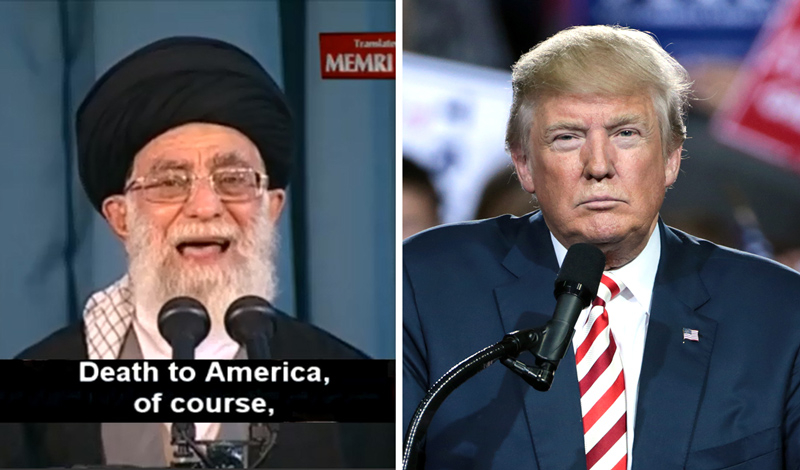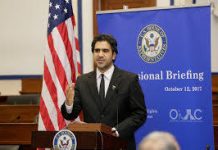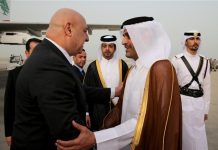Donald Trump’s grand ambitions in the region
Fawaz Turki/Al Arabiya/May 07/17
He brags. And he does it with impressive ease. As a case in point, President Donald Trump proclaimed recently that his first 100 days in office have been among “the most productive in US presidential history.” A lot of commentators, not to mention presidential historians, chuckled a bit, and let that boast slide. His latest boast was made last Wednesday as he met with Palestinian leader Mahmoud Abbas in the White House. “It’s something that I think may not be as difficult as people have thought over the years,” he said. “We will get this done.”
He was referring to the seemingly insoluble Palestinian conflict — along with that conflict’s broader dimension, the inter-state dispute between Israel and and the Arab countries — that stretches back to the British Mandate, when the Foreign Office in London tried its hand at conflict resolution by introducing peace plans stretching from the Peel Commission to the White Paper — to no avail. Then after Britain had its eclipse, and the United States its day as a big power, Washington tried, and tried and tried again, to search for a peace settlement, all the way from The Rogers Peace Plan in 1969 to Secretary of State John Kerry’s initiative in 2014 — with the conflict continuing to elude resolution.
These efforts all ended with well-meaning mediators banging their heads against the wall, after trying and then failing to push that rock up the hill, as Israel, during its five decades of occupation — already the longest military occupation ever of one people by another — showed no sign of backing off its hard-line policies.
Negotiating a deal
President Trump, who claims to be skilled at the “art of the deal,” said that he would do all he could (“whatever is necessary”) to negotiate an agreement, though he offered no sense of how he would go about doing it or what the agreement would entail (he made no mention of the two-state solution in his remarks last Wednesday). Wanton psychologizing aside, President Trump appears to see himself — grandiose the self-image may be — as a latter-day George Mallory, with the Middle East conflict as his Everest. And like Mallory, who wanted to climb Earth’s highest mountain “because it’s there,” the American chief executive, the ultimate deal-maker, wants to solve that conflict “because it’s intractable.” Donald Trump, the 45th president of the United States of America, has his work cut out for him. If he grows with his job — and let’s face it, he needs to do that, given the fact that he has no experience in diplomacy, politics or the military — he may, just may, morph into the “mold-breaker” he unabashedly brags about being.
And Trump’s first trip abroad as president later this month, which begins with a visit to the Kingdom, followed by visits to Israel — with a stop in the occupied territories, hosted by President Abbas — and Vatican City, is meant to cement the impression that he is different, a “mold-breaker” adept at consummating a deal, regardless of how tough the challenge that deal may present. And what tougher challenge is there than to wade through, and take a shot at solving, the Arab-Israeli conflict, which, as he claimed with optimistic flourish last Wednesday, is really “not as difficult as people have thought over the years”?
Close allies
To be sure, an American president visiting the Kingdom is not an altogether unusual or rare event. Saudi Arabia and the United States have been close allies for well over seven decades, since President Franklin Roosevelt and King Abdul Aziz in February 1945 met aboard the US cruiser Quincy — docked in Great Bitter Lake in the Suez Canal — and their governments bonded thereafter. Moreover, Saudi Arabia is seen by the US as a major, perhaps the major, regional power in the Middle East today.
No doubt Saudi officials will remind the American president, during his visit, of the olive branch the Arab countries have extended to Israel (with no reciprocal response), namely the Arab Peace Plan, endorsed by all member states of the Arab League at the Beirut Summit in 2002, and re-endorsed at subsequent summits in 2007 and 2017, a bold peace plan that calls for normalizing relations between Arab countries and Israel, in exchange for a full withdrawal by the Zionist state from the Arab territories conquered in 1967, along with a “just settlement” of the Palestinian refugee problem based on UN Resolution 194.
Softening image
Certainly, the American chief executive’s visit to Saudi Arabia, home of Islam’s holiest shrines, will, if nothing else, soften his image in the Islamic world as the president who had uttered some intemperate language about that world’s faith, and who recently imposed a ban on entry to the US of refugees and travelers from several Muslim countries.
In Israel, Trump’s main event will be a visit to Masada, where in the first century AD ancient Israelite zealots held off a Roman siege for a year before committing suicide. The symbolism of the venue seems to have passed largely unnoticed by commentators, including Israeli ones, for Masada embodies everything we associate with religious extremism — extremism emblematic of the self-destructiveness of today’s Jewish zealots, who are the backbone of the colonial project in the Palestinian occupied territories. And, yes, who has problems with the American president meeting in Vatican City with Pope Francis, spiritual leader of 1.2 billion Catholics, not to mention the most congenial and progressive pontiff in recent memory, whose support for the oppressed and underprivileged around the world, including Palestinians, is legion?
Donald Trump, the 45th president of the United States of America, has his work cut out for him. If he grows with his job — and let’s face it, he needs to do that, given the fact that he has no experience in diplomacy, politics or the military — he may, just may, morph into the “mold-breaker” he unabashedly brags about being.




















